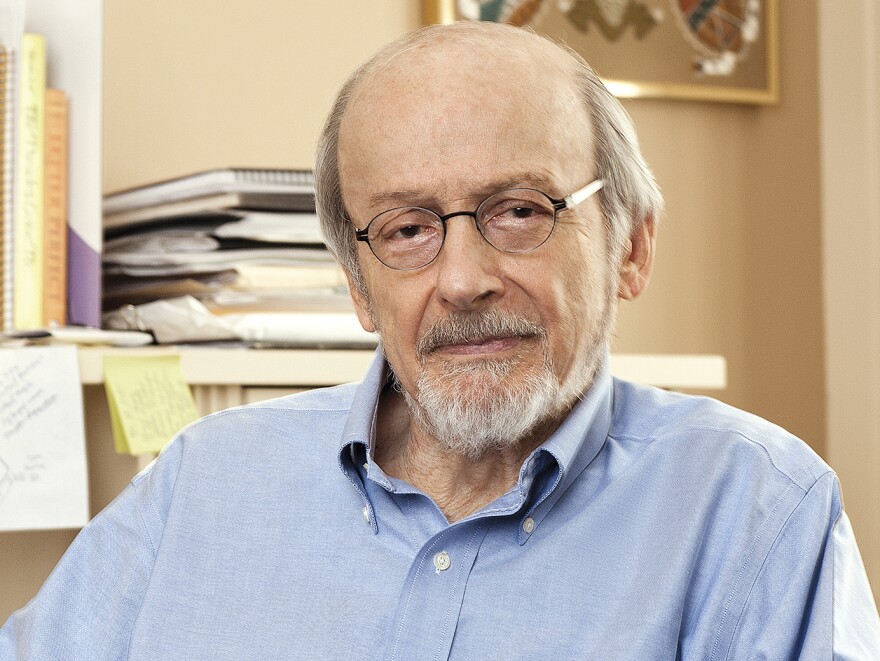
E.L. Doctorow's 19th book, Andrew's Brain, is a real head-scratcher. This short, perplexing but occasionally potent novel presents particular challenges to a critic, as it's difficult to discuss its enigmas without giving away its odd twists. What I can say is that what starts out as a tale of lost love ends up taking a baffling political turn into rather biting commentary on post-Sept. 11 America.
This is hardly Doctorow's first book with a political slant. A recurrent theme in his remarkable fiction has been the way public historical events resonate in private lives. In The Book of Daniel, Doctorow explored guilt, innocence and the lasting effects on the children of two executed spies much like Julius and Ethel Rosenberg. The March, his 2006 multi-award winner, took on the racial issues and collateral damage of the American Civil War in a novel with the breadth of a Russian epic. His 2010 novel, Homer & Langley, based on the hoarding Collyer Brothers, considered the lasting trauma of World War I, the brain's amazing plasticity and ability to pretend, and the wavering line between sanity and insanity — psychological themes he returns to in Andrew's Brain.
Yet unlike Doctorow's previous historical fiction, Andrew's Brain focuses on a period so recent it feels like the day before yesterday. Like the teeming casts in March and his early bestseller, Ragtime, which mixed fictional and historical characters, the much-reduced roster in Andrew's Brain also includes well-known politicos in cameo roles.
In the tradition of Portnoy's Complaint, Catcher in the Rye, and Lolita, Andrew's Brain takes the form of a confessional monologue. The listener in this case, called "Doc," may or may not be a psychiatrist. Andrew's life story, as he tells it, is one calamity after another, from clumsy pratfalls to more serious damage for which he feels responsible. He's hapless, highly educated, cerebral and mostly sympathetic. He often speaks of himself in the third person — literally estranged from his emotions. Doc occasionally interrupts, trying to direct the narrative flow with questions we readers would like answered, too.
Doctorow snags us with his opening lines: "I can tell you about my friend Andrew, the cognitive scientist. But it's not pretty. One evening he appeared with an infant in his arms at the door of his ex-wife, Martha. Because Briony, his lovely young wife after Martha, had died." "Of what?" his listener asks. "We'll get to that," Doctorow's narrator answers. A few pages later, Doc asks, "Are you in fact the man you call your friend Andrew, the cognitive scientist who brought an infant child to the home of his ex-wife?" "Yes," Andrew answers succinctly.
We keep reading through bizarre turns and sometimes abstruse discussions of consciousness, hoping for a payoff that never comes. "You are in the depthless dingledom of your own soul," Andrew tells his students. Huh? This grieving widower observes with surprising lyricism that "love is the blunt concussion that renders us insensible to despair. ... Something happens in the heart, you know. You recognize life as it should be." Self-knowledge, on the other hand, is elusive because "it is dangerous to stare into yourself. You pass through endless mirrors of self-estrangement. This too is the brain's cunning, that you are not to know yourself."
Several plot points startle and mystify Doc as much as the reader. Chapters become progressively shorter, and we're not sure what to believe because everything is filtered through Andrew's unreliable mind. As he notes — echoing R.D. Laing — "How can I think about my brain when it's my brain doing the thinking?" More problematic, however, is that we're not sure what Doctorow wants us to believe.
Andrew, so used to blaming himself for disasters, sees a broader, political culprit in his wife's death. He tells Doc, "I've always responded to the history of my times. I've always attended to the context of my life." It's a statement that certainly applies to Doctorow and goes a long way toward explaining the power of his work — even if it doesn't answer key questions in this puzzling, ultimately disappointing novel.
Copyright 2023 NPR. To see more, visit https://www.npr.org.

